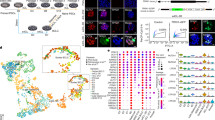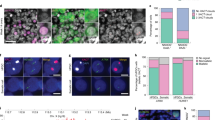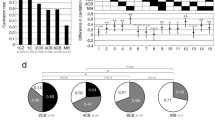Abstract
Only mammals have relinquished parthenogenesis, a means of producing descendants solely from maternal germ cells. Mouse parthenogenetic embryos die by day 10 of gestation1,2,3,4. Bi-parental reproduction is necessary because of parent-specific epigenetic modification of the genome during gametogenesis5,6,7,8. This leads to unequal expression of imprinted genes from the maternal and paternal alleles9. However, there is no direct evidence that genomic imprinting is the only barrier to parthenogenetic development. Here we show the development of a viable parthenogenetic mouse individual from a reconstructed oocyte containing two haploid sets of maternal genome, derived from non-growing and fully grown oocytes. This development was made possible by the appropriate expression of the Igf2 and H19 genes with other imprinted genes, using mutant mice with a 13-kilobase deletion in the H19 gene10 as non-growing oocytes donors. This full-term development is associated with a marked reduction in aberrantly expressed genes. The parthenote developed to adulthood with the ability to reproduce offspring. These results suggest that paternal imprinting prevents parthenogenesis, ensuring that the paternal contribution is obligatory for the descendant.
This is a preview of subscription content, access via your institution
Access options
Subscribe to this journal
Receive 51 print issues and online access
$199.00 per year
only $3.90 per issue
Buy this article
- Purchase on Springer Link
- Instant access to full article PDF
Prices may be subject to local taxes which are calculated during checkout



Similar content being viewed by others
References
Surani, M. A. H. & Barton, S. C. Development of gynogenetic eggs in the mouse: Implications for parthenogenetic embryos. Science 222, 1034–1036 (1983)
Surani, M. A. H., Barton, S. C. & Norris, M. L. Development of reconstituted mouse eggs suggests imprinting of the genome during gametogenesis. Nature 308, 548–550 (1984)
Surani, M. A. et al. Genome imprinting and development in the mouse. Development (suppl.), 89–98 (1990)
McGrath, J. & Solter, D. Completion of mouse embryogenesis requires both the maternal and paternal genomes. Cell 37, 179–183 (1984)
Brannan, C. I. & Bartolomei, M. S. Mechanisms of genomic imprinting. Curr. Opin. Genet. Dev. 9, 164–170 (1999)
Tilghman, S. M. The sins of the fathers and mothers: Genomic imprinting in mammalian development. Cell 96, 185–193 (1999)
Mann, J. R. Imprinting in the germ line. Stem Cells 19, 287–294 (2001)
Li, E. Chromatin modification and epigenetic reprogramming in mammalian development. Nature 3, 662–673 (2002)
Obata, Y. & Kono, T. Maternal primary imprinting is established at a specific time for each gene throughout oocyte growth. J. Biol. Chem. 277, 5285–5289 (2002)
Leighton, P. A., Ingram, R. S., Eggenschwiler, J., Efstratiadis, A. & Tilghman, S. M. Disruption of imprinting caused by deletion of the H19 gene region in mice. Nature 375, 34–39 (1995)
Lucifero, D., Mertineit, C., Clarke, H. J., Bestor, T. H. & Trasler, J. M. Methylation dynamics of imprinted genes in mouse germ cells. Genomics 79, 530–538 (2002)
Kono, T., Obata, Y., Yoshimzu, T., Nakahara, T. & Carroll, J. Epigenetic modifications during oocyte growth correlates with extended parthenogenetic development in the mouse. Nature Genet. 13, 91–94 (1996)
Obata, Y. et al. Disruption of primary imprinting during oocyte growth leads to the modified expression of imprinted genes during embryogenesis. Development 125, 1553–1560 (1998)
Feil, R., Walter, J., Allen, N. D. & Reik, W. Developmental control of allelic methylation in the imprinted mouse Igf2 and H19 genes. Development 120, 2933–2943 (1994)
Thorvaldsen, J. L., Duran, K. L. & Bartolomei, M. S. Deletion of the H19 differentially methylated domain results in loss of imprinted expression of H19 and Igf2. Genes Dev. 12, 3693–3702 (1998)
Hark, A. T. et al. CTCF mediates methylation-sensitive enhancer-blocking activity at the H19/Igf2 locus. Nature 405, 486–489 (2000)
Leighton, P. A., Saam, J. R., Ingram, R. S., Stewart, C. L. & Tilghman, S. M. An enhancer deletion affects both H19 and Igf2 expression. Genes Dev. 9, 2079–2089 (1995)
Ripoche, M. A., Kress, C., Poirier, F. & Dandolo, L. Deletion of the H19 transcription unit reveals the existence of a putative imprinting control element. Genes Dev. 11, 1596–1604 (1997)
Kono, T., Sotomaru, Y., Katsuzawa, Y. & Dandolo, L. Mouse parthenogenetic embryos with monoallelic H19 expression can develop to day 17.5 of gestation. Dev. Biol. 243, 294–300 (2002)
Wang, Z. Q., Fung, M. R., Barlow, D. P. & Wagner, E. F. Regulation of embryonic growth and lysosomal targeting by the imprinted Igf2/Mpr gene. Nature 372, 464–467 (1994)
Theiler, K. The House Mouse: Atlas of Embryonic Development 122–128 (Springer, Berlin, 1989)
Eisen, M. B., Spellman, P. T., Brown, P. O. & Botstein, D. Cluster analysis and display of genome-wide expression patterns. Proc. Natl Acad. Sci. USA 95, 14863–14868 (1998)
Schmidt, J. V., Matteson, P. G., Jones, B. K., Guan, X. J. & Tilghman, S. M. The Dlk1 and Gtl2 genes are linked and reciprocally imprinted. Genes Dev. 14, 1997–2002 (2000)
Kobayashi, S. et al. Mouse Peg9/Dlk1 and human PEG9/DLK1 are paternally expressed imprinted genes closely located to the maternally expressed imprinted genes: mouse Meg3/Gtl2 and human MEG3. Genes Cells 5, 1029–1037 (2000)
Lin, S. P. et al. Asymmetric regulation of imprinting on the maternal and paternal chromosomes at the Dlk1-Gtl2 imprinted cluster on mouse chromosome 12. Nature Genet. 35, 97–102 (2003)
Georgiades, P., Watkins, M., Surani, M. A. & Ferguson-Smith, A. C. Parental origin-specific developmental defects in mice with uniparental disomy for chromosome 12. Development 127, 4719–4728 (2000)
Georgiades, P., Watkins, M., Burton, G. J. & Ferguson-Smith, A. C. Roles for genomic imprinting and the zygotic genome in placental development. Proc. Natl Acad. Sci. USA 98, 4522–4527 (2001)
Moore, T. & Haig, D. Genomic imprinting in mamalian development: a parental tug-of -war. Trends Genet. 7, 45–49 (1991)
Reik, W. & Walter, J. Genomic imprinting: parental influence on the genome. Nature Rev. Genet. 2, 21–32 (2001)
Murphy, S. K. & Jirtle, R. L. Imprinting evolution and the price of silence. BioEssays 25, 577–588 (2003)
Acknowledgements
We thank A. Surani, Wellcome CRC Institute, J. Carroll, University College London and T. Moore, University College Cork, Ireland, for critical reading and discussions; O.-Y. Kwon, MacroGen, for microarray analysis; and T. Kumagai for technical assistance. This work was supported by grants from the Bio-oriented Technology Research Advancement Institution (BRAIN), Japan, and The Ministry of Education, Science, Culture and Sports of Japan.
Author information
Authors and Affiliations
Corresponding author
Ethics declarations
Competing interests
The authors declare that they have no competing financial interests.
Supplementary information
Supplementary Figure 1
Expression profile comparisons by oligonucleotide mouse 11K microarray analysis. (JPG 108 kb)
Supplementary Figure 2
Graphical representation of ontology comparison. (JPG 346 kb)
Supplementary Figure 3
Histograms of a number of differentially expressed genes. (JPG 151 kb)
Supplementary Figure 4
Histograms of a number of differentially expressed genes. (JPG 220 kb)
Rights and permissions
About this article
Cite this article
Kono, T., Obata, Y., Wu, Q. et al. Birth of parthenogenetic mice that can develop to adulthood. Nature 428, 860–864 (2004). https://doi.org/10.1038/nature02402
Received:
Accepted:
Issue Date:
DOI: https://doi.org/10.1038/nature02402
This article is cited by
-
Transposable elements shape the evolution of mammalian development
Nature Reviews Genetics (2021)
-
Three paternally imprinted regions are sequentially required in prenatal and postnatal mouse development
Science China Life Sciences (2020)
-
Temporal regulation of prenatal embryonic development by paternal imprinted loci
Science China Life Sciences (2020)
-
Increased methylation upstream of the MEG3 promotor is observed in acute myeloid leukemia patients with better overall survival
Clinical Epigenetics (2019)
-
Abnormal gametogenesis induced by p53 deficiency promotes tumor progression and drug resistance
Cell Discovery (2018)
Comments
By submitting a comment you agree to abide by our Terms and Community Guidelines. If you find something abusive or that does not comply with our terms or guidelines please flag it as inappropriate.



